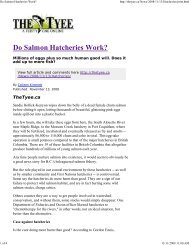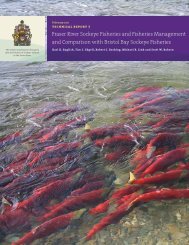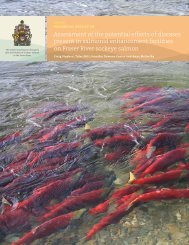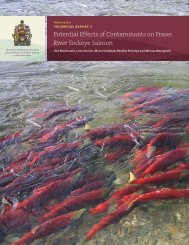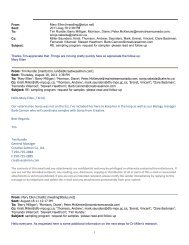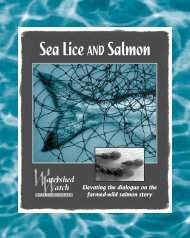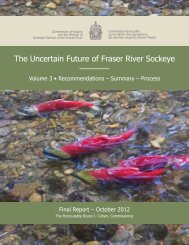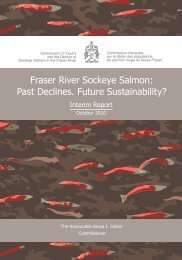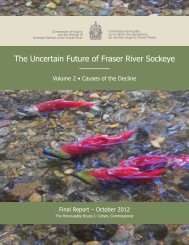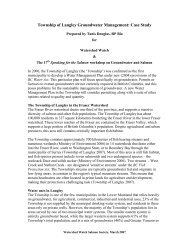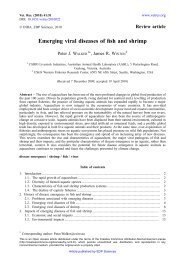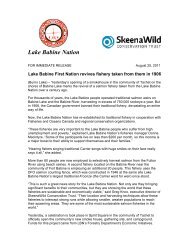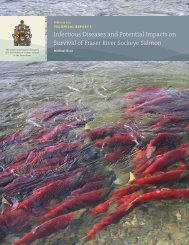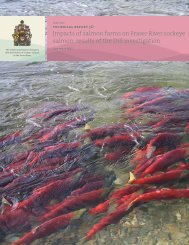- Page 1:
April 2011technical report 6Fraser
- Page 7 and 8:
Stage 2: Smolt OutmigrationWe analy
- Page 9 and 10:
of multiple stressors and factors,
- Page 11 and 12:
4.3.5 Other evidence ..............
- Page 13 and 14:
List of TablesTable 4.2-1. Evaluati
- Page 16 and 17:
List of FiguresFigure 2.3-1. Cumula
- Page 18 and 19:
these integrative frameworks, conve
- Page 21 and 22:
2.0 Cumulative Impacts or Effects2.
- Page 23 and 24:
assumed that there is no potential
- Page 25 and 26:
classes of stressors. However, if s
- Page 27:
affected by many stressors over its
- Page 30 and 31:
examples illustrate this problem --
- Page 32 and 33:
possibly even negligible component
- Page 34 and 35:
Figure 3.3-1. The conceptual model
- Page 36 and 37:
3.3.3 Life history perspective/appr
- Page 38 and 39:
additional analyses to gain further
- Page 40 and 41:
Figure 3.3-3. Flow diagram used to
- Page 42 and 43: This project is unusual in its scop
- Page 45 and 46: 4.0 Results, Synthesis and Discussi
- Page 47 and 48: Peterman and Dorner (2011) have thr
- Page 49 and 50: Figure 4.1-3. Estimates of long ter
- Page 51 and 52: Figure 4.1-5. A) Total run size of
- Page 53 and 54: Figure 4.1-6. Aggregate returns to
- Page 55 and 56: o were generally worse during the l
- Page 57 and 58: Freshwater predators on juvenile so
- Page 59 and 60: copper, iron, mercury and silver).
- Page 61 and 62: Several analyses by MacDonald et al
- Page 63 and 64: abundances (Sproat, Klukshu, Chilka
- Page 65 and 66: feel reasonably confident in this c
- Page 67 and 68: Nelitz et al. (2011; Table 18) foun
- Page 69 and 70: in the Lower Fraser than other Fras
- Page 71 and 72: stressors. Thus our conclusions hav
- Page 73 and 74: There are many marine predators tha
- Page 75 and 76: assumption that exposure occurs whe
- Page 77 and 78: observations that are then averaged
- Page 79 and 80: Johannes et al. (2011) demonstrate
- Page 81 and 82: “likely” contributor to the ove
- Page 83 and 84: Table 4.4-2. Model specifications f
- Page 85 and 86: Region Variable M1 M2 M3 M4 M5 M6 M
- Page 87 and 88: 3. survival rates within key portio
- Page 89 and 90: 2011). The thermal limit hypothesis
- Page 91: Historically, the majority of retur
- Page 95 and 96: declines (discussed in section 4.2
- Page 97 and 98: There is indisputable evidence of t
- Page 99 and 100: Figure 4.6-2. Number of years that
- Page 101 and 102: correlation was statistically signi
- Page 103 and 104: 4.6.7 Key things we need to know be
- Page 105 and 106: al (2010). The combined effect of a
- Page 107 and 108: more likely to suffer en-route and
- Page 109 and 110: Table 4.7-2. Variables included in
- Page 111 and 112: However, an important limitation is
- Page 113 and 114: Alternative PreyVariablesModelsM1 M
- Page 115 and 116: will likely have a high correlation
- Page 117 and 118: 5.0 Conclusion5.1 Important Contrib
- Page 119 and 120: Stage 5: Migration back to SpawnWhi
- Page 121 and 122: More specifically, the extended res
- Page 123 and 124: The twelve highest priority recomme
- Page 125 and 126: Life stagefor FraserRiversockeyesal
- Page 127 and 128: 6.0 ReferencesAinsworth, L.M., Rout
- Page 129 and 130: Johannes, M.R.S., R. Hoogendoorn, R
- Page 131: Schaller et al. 2007. Comparative S
- Page 134 and 135: utilized to clarify the full range
- Page 137 and 138: Appendix 2. Reviewer Evaluations an
- Page 139 and 140: the conclusions of the Expert Panel
- Page 141 and 142: Response: Figure numbers have been
- Page 143 and 144:
Response: This section has been com
- Page 145 and 146:
ased on time or other stocks) to
- Page 147 and 148:
them in terms of how changes in spa
- Page 149 and 150:
efer to some variable being include
- Page 151 and 152:
... (Table xx)". Structures of thes
- Page 153 and 154:
Report Title: Fraser River sockeye
- Page 155 and 156:
show stronger correlations. Hence,
- Page 157 and 158:
Fraser and non-Fraser sockeye popul
- Page 159 and 160:
a single database for other researc
- Page 161 and 162:
Response: We have removed the itali
- Page 163 and 164:
evidence unique to each life stage.
- Page 165 and 166:
Report Title: Data Synthesis and Cu
- Page 167 and 168:
Response: We have further emphasize
- Page 169 and 170:
5. I would also encourage the autho
- Page 171 and 172:
events occur, it should be possible
- Page 173 and 174:
I don’t have anything to add beyo
- Page 175 and 176:
constitutes an exposure to human ac
- Page 177 and 178:
3.3.1 has been revised to say “As
- Page 179:
most likely contributors to the rec
- Page 182 and 183:
A3.2.1 Integrative quantitative met
- Page 184 and 185:
Table A3.3-1. A summary of data set
- Page 186 and 187:
ProjectNumber Project Name Variable
- Page 188 and 189:
ProjectNumber Project Name Variable
- Page 190 and 191:
A3.4 Data PreparationContractor dat
- Page 192 and 193:
Table A3.4-2. An example entry in t
- Page 194 and 195:
Table A3.4-5. Brood year adjustment
- Page 196 and 197:
Table A3.4-7. Example output from t
- Page 198 and 199:
Table A3.4-9. The table of contents
- Page 200 and 201:
ProjectNumberProject Variable Subse
- Page 202 and 203:
ProjectNumberProject Variable Subse
- Page 204 and 205:
ProjectNumberProject Variable Subse
- Page 206 and 207:
ProjectNumberProject Variable Subse
- Page 208 and 209:
ProjectNumberProject Variable Subse
- Page 210 and 211:
ProjectNumberProject Variable Subse
- Page 212 and 213:
The objective of our approach is to
- Page 214 and 215:
investigated ecosystems” (Burkhar
- Page 216 and 217:
Figure A3.5-1. Flow diagram used to
- Page 218 and 219:
multiple stresses simultaneously. T
- Page 220 and 221:
Change point analysis of productivi
- Page 222 and 223:
Figure A3.5-1. This is an example o
- Page 224 and 225:
ecruits for this analysis as we wan
- Page 226 and 227:
exclude covariates with limited yea
- Page 228 and 229:
Figure A3.5-3. Average chlorophyll
- Page 230 and 231:
Status only data setsIn many cases
- Page 232 and 233:
The A-series of model sets based on
- Page 234 and 235:
with this report given the vast sco
- Page 236 and 237:
Table A3.5-5. Example of the model
- Page 238 and 239:
categories of stressors. We cannot
- Page 240 and 241:
o In some cases it may be the timin
- Page 242 and 243:
Appendix 4. Quantitative ResultsA4.
- Page 244 and 245:
alance” over time and so this it
- Page 246 and 247:
Figure A4.2-3. Stock composition fo
- Page 248 and 249:
Figure A4.2-5. Stock composition fo
- Page 250 and 251:
A4.3 Multiple Regression ResultsA4.
- Page 252 and 253:
Life stage Stressor category Variab
- Page 254 and 255:
The results show strong support for
- Page 256 and 257:
ModelSet_A4c_VarName M1 M2 M3 M4 M5
- Page 258 and 259:
Table A4.3-7. Estimates for all fix
- Page 260 and 261:
A4.3.3Analyses by stressor category
- Page 262 and 263:
Table A4.3-10. Estimates for all fi
- Page 264 and 265:
Model: B4bBrood years: 1969-2001We
- Page 266 and 267:
Table A4.3-12. Estimates for all fi
- Page 268 and 269:
A4.3.4Analysis by regionModel: C4a1
- Page 270 and 271:
Table A4.3-15. Estimates for all fi
- Page 272 and 273:
suggest any underlying mechanism, b
- Page 274 and 275:
Model: C1a1996-2004For 1996-2004, i
- Page 276 and 277:
Table A4.3-21. Estimates for all fi
- Page 278 and 279:
Table A4.3-23. SoG C1a candidate mo
- Page 281 and 282:
Appendix 5. Data Template User Guid
- Page 283 and 284:
Metric Connected to Biologically-su
- Page 285 and 286:
Initial Conceptual Model (Worksheet
- Page 287 and 288:
Commentsopen again. It is acceptabl
- Page 289 and 290:
Appendix 6. Workshop Report 1 (Nov.
- Page 291 and 292:
Table of ContentsTable of Contents
- Page 293 and 294:
PresentationsProductivity Dynamics
- Page 295 and 296:
and scope for improvement, particul
- Page 297 and 298:
Workshop participants pointed out t
- Page 299 and 300:
o Can you find the same shared tren
- Page 301 and 302:
generally better for Alaska sockeye
- Page 303 and 304:
Relative Likelihood of Alternative
- Page 305:
There was widespread agreement with
- Page 308 and 309:
Appendix A: List of Projects and In
- Page 310 and 311:
Peer Reviewers: Provide constructiv
- Page 312 and 313:
MacDonald Environmental Sciences Lt
- Page 314 and 315:
Appendix C: Workshop MinutesContent
- Page 316 and 317:
Levy urged researchers to bear in m
- Page 318 and 319:
within-population, within-brood-yea
- Page 320 and 321:
To address potential skepticism ove
- Page 322 and 323:
instead of migrating directly out i
- Page 324 and 325:
considered a good surrogate of temp
- Page 326 and 327:
Bristol Bay review: There are subst
- Page 328 and 329:
Method: The approach included formu
- Page 330 and 331:
Staley: Our project needs to compar
- Page 332 and 333:
Levy: It will go ahead in January.
- Page 334 and 335:
preliminary assessment of potential
- Page 336 and 337:
MacDonald: We’re waiting for all
- Page 338 and 339:
including Shuswap and North Thompso
- Page 340 and 341:
and biological variables. The combi
- Page 342 and 343:
temperatures. Notably, it doesn’t
- Page 344 and 345:
Seasonal population distribution pa
- Page 346 and 347:
Information gaps: The most importan
- Page 348 and 349:
Fraser sockeye salmon habitat analy
- Page 350 and 351:
survey data, but they were looking
- Page 352 and 353:
was also shown that tagged fish ret
- Page 354 and 355:
English: There was extensive holdin
- Page 356 and 357:
periods showed that 4 to 6 stocks (
- Page 358 and 359:
Q/A: Researchers should also feel f
- Page 360 and 361:
Peterman: We’re lacking the big p
- Page 362 and 363:
Appendix D: Table of likelihood/ hy



